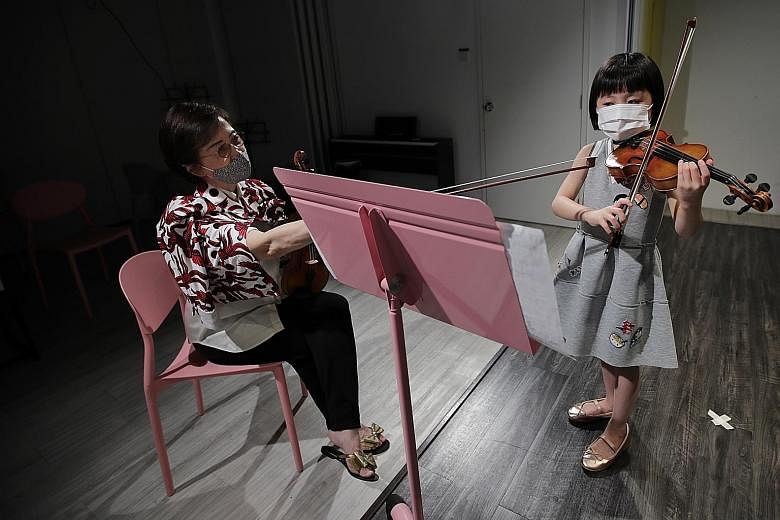Ms Ong Soh Ching still remembers the anxiety on the morning of Dec 12 last year when her younger daughter Nadine Ang took her Grade 5 music theory exam.
The 11-year-old could not log in at the stipulated time to take the online assessment set by the London-based Associated Board of the Royal Schools of Music (ABRSM).
An error message pointed to a Wi-Fi connection issue, but Ms Ong's telco provider said the service was fine. She rang the technical support line, but realised the phone number given by the exam board was wrong.
Half an hour later, Nadine finally logged in. The initial fear that she would have less than her allocated two hours to complete the exam proved unfounded - she still had the same amount of time.
"I think too many candidates were logging in at the same time and the system could not support it," says Ms Ong, 47, a part-time consultant and mother of two. She added that many other parents shared the same frustrations.
In normal times, Nadine would have joined hundreds of others at venues like the Suntec Singapore Convention and Exhibition Centre to sit the music theory exam.
But the coronavirus pandemic has forced music exams, both theory and practical ones, to move online.
This has sparked confusion and anxiety for parents, students and music educators who have had to adjust to new practices.
"The challenges of delivering exams online involve preserving the integrity and robustness of assessment, while also expecting our applicants and candidates to quickly adapt to new procedures," says ABRSM executive director Penny Milsom.
In response to the glitches in December, the board has cancelled its online music theory exam scheduled for next month so as to upgrade its system.
Ms Milsom said its online theory exam has been rolled out in eight out of over 90 countries so far, the first time that it is running exams online since its founding in 1889. About 6,000 candidates in Singapore took the exam in December.
Like the ABRSM, many global music exam boards have come up with alternative ways of administering exams, given travel curbs, social distancing measures and lockdowns in some countries.
Examiners usually fly in from overseas - mostly Britain - to hold the graded practical assessments.
Trinity College London launched its first online exam last July. Its associate director of music Fran-cesca Christmas did not disclose the number of candidates from Singapore.
Six-year-old Gemmi Lim was among the first here to take Trinity's Grade 5 online exam. The Wolfgang Violin Studio student recorded three pieces for submission at her school.
Wolfgang's director and principal, Mrs Annie Lee, says her team has been helping students adapt to online exams, especially for practical assessments.
There are differences between playing live in front of examiners and being judged from a video recording, she adds. For example, she is concerned that the variation in loudness between notes - known as dynamics - may not be picked up in videos. She has heard of candidates who go for a professional recording.
However, Ms Christmas from Trinity says the recording equipment available on smartphones and tablets has more than enough quality - even at the lowest settings - to capture clearly the audio of a performance for assessment.
"One of the key principles underpinning the digital grades and diplomas is that it should be accessible to all of our candidates, and none should be disadvantaged due to lack of access to high-tech recording equipment."
Besides offering guidance on how to film their performance, she says the board also allows candidates to submit a new video if the one they sent is not clear enough.
ABRSM's Ms Milsom also gives the assurance that smartphone recordings are of a sufficient quality for examiners to accurately and fairly assess performances.
Cristofori Music School's business development manager Eunice Tan says students who took the ABRSM theory exam in December managed to complete it despite the technical issues.
Cristofori, which has 35 outlets and 16,000 students, also arranges for those who learn contemporary instruments, such as drums and electric guitars, to take music exams with Rockschool.
This Britain-based exam board now assesses candidates via live streaming instead of video submissions. Cristofori helped with the technical set-up, which comprises multiple projection screens, when its students sat the exam at its branches in November.
As the pandemic stretches out, more changes and fine-tuning of music exams are expected.
For instance, Trinity rolled out changes to its exams in November after getting feedback about its tests in July. Candidates had to play scales and arpeggios, in addition to three exam pieces.
Wolfgang's Mrs Lee is hopeful that the online exams will get better. "We just have to embrace the new norm," she says.
Parents interviewed are taking the disruptions in their stride.
"We may complain about the changes, but at the end of the day, we are understanding," says Ms Ong, whose daughters Nadine and Avril, 13, took ABRSM's Grade 5 and 6 practical piano exams respectively last month.
Gemmi's mum Ong Ting Nee, 46, who works at a media company, hopes that her only child will learn perseverance through music.
"As the repertoire gets harder, I hope she will continue to have mental strength to learn and enjoy the beautiful world of music," she says.


